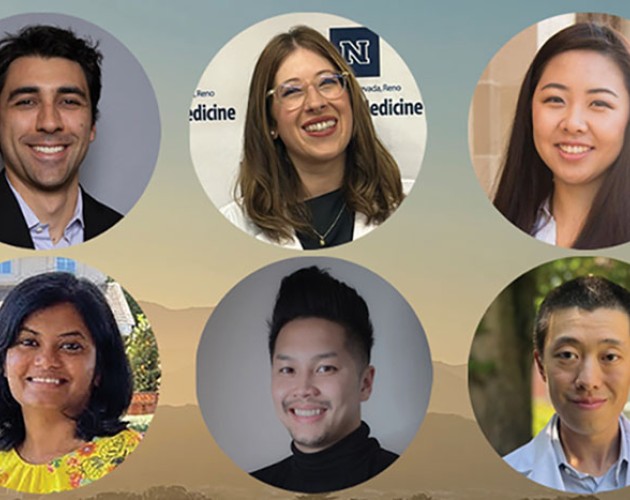Staying on Track to a CLS Program

When Khatu Nguyen earned her bachelor’s degree in neuroscience from University of California, Riverside, she hadn’t envisioned herself working in the lab—let alone applying to a CLS program. Her goal was to become a neuropsychologist, but like so many others, the pandemic created a detour in her professional aspirations.
“I actually did not consider a career in the lab until almost a year after I graduated,” Khatu reflects. “Due to the COVID pandemic, I ended up as laboratory assistant at Bridge Diagnostics and recognized that I could see myself doing this long-term.”
In this role, Khatu processed COVID specimens for a few months and then transitioned to a clinical laboratory assistant role at Clarity Lab Solutions, which specializes in precision molecular testing.
She had found her calling. “Personally,” Khatu explains, “I couldn't imagine myself in a career outside of health care. I love science and helping people, but I was not interested in medical school or nursing.” Already enjoying being in the lab, Khatu was ready to push herself and work toward applying to a CLS program.
Step one to reaching this goal: Completing our Clinical Laboratory Scientist Preparatory Program.
The UC Berkeley Extension program gave me the opportunity to easily access the curriculum with qualified instruction.
You completed the program in October 2022. Why did you choose our courses?
I chose UC Berkeley Extension because the online asynchronous classes were flexible and convenient for me—I was working full time as a lab technologist at Scipher Medicine at the time.
Commuting to a school, researching its facilities and navigating the campus would have taken up a lot of time that I didn't have. In addition, many classes at other schools were held during business hours and have limited seats that are reserved for matriculated students.
Because I studied neuroscience in my undergrad, I was missing a lot of education pertaining to immunology and molecular cell biology. The UC Berkeley Extension program gave me the opportunity to easily access the curriculum with qualified instruction.
I had regular down-time during my job, which gave me time to study, but the coursework was still very challenging!
Which courses did you take?
I took three core courses—Hematology, Biochemistry and Immunology—and I plan to use them as prerequisites toward a CLS program.
The classes were very extensive, with a lot of writing assignments. The assignments were manageable, but it was important to be detailed and thorough. Many prompts were open ended, so you had a lot of flexibility on what you could research and write about. We were also encouraged to read and discuss other classmates' assignments. It was a good way to explore other topics and dig deeper into the curriculum!
I took all three courses online, which I enjoyed because I could study from home at my own pace. I didn't have to worry about finding parking or showing up to class on time. Also, I could take as many breaks as I needed!
Fortunately, I had regular down-time during my job, which gave me time to study, but the coursework was still very challenging!
My tips for anyone starting the program is to get on top of your time management and having a strong support system at home really helps. Write down when your exams and assignments are due on a calendar and pace yourself. Be prepared to make sacrifices such as missing out on social events, but also recognize when you're pushing yourself too hard. Make sure to take care of your body and mind. Take breaks, drink enough water and get enough sleep.
Since completing the program, you’re continuing to invest in your education as you prepare to apply to a CLS program.
I am taking a bacterial pathogenesis class at California State University Long Beach, which teaches how bacteria invades our bodies and causes disease. The immunology course I took at Extension has been very helpful and relevant for this class as there is overlap in course material!
I haven't started a training program yet, but I know CLS programs will expand on what I have learned so far. There is a lot that still needs to be learned, such as serology and toxicology. I plan on applying this upcoming cycle and would like to stay local: My top choices are UC Irvine and California State University, Los Angeles.
Finishing the Extension program means that I have made a commitment toward my goal of being admitted into a CLS program!
And you’ve also started a new job as a regional account representative at precision oncology company Agendia.
My main task is reading through pathology reports from breast cancer patients. My Extension classes were relevant as I had a better understanding of how cancer metastasized, and the medical terminology was easier for me to pick up.Thanks to my immunology course, I have a firm understanding of antibody structure and function, the difference between the innate and adaptive immune system, and how inflammation contributes to host defense. I also learned the different types of lymphocytes and their function and contribution toward our health. These are all topics relevant to my current class, and it has been great not having to worry about learning those topics from square one!
Finishing the Extension program means that I have made a commitment toward my goal of being admitted into a CLS program! While I am in the process of applying, I’m already envisioning my future. In the next five years, I plan on finishing a CLS program and getting my state license as a generalist. I would like to work in a hospital so I can work in several departments and keep my skills sharp. Most importantly, I want to help patients!


